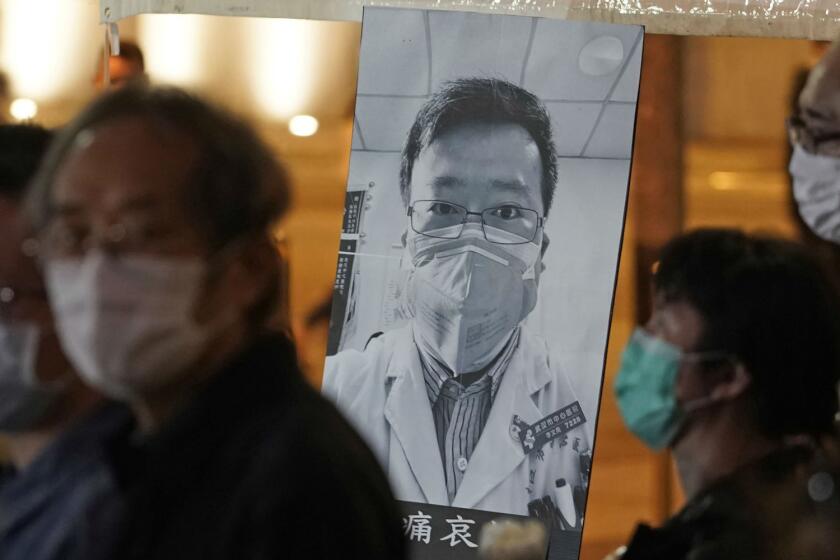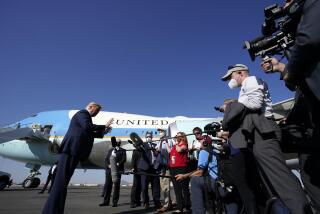Trump touts unproven coronavirus remedies, drawing a diplomatic correction

WASHINGTON — President Trump, facing a national outcry over the lack of available coronavirus testing and an imminent spike in positive cases, tried to inject some optimism into the situation Thursday, suggesting that two existing drugs may be effective remedies and saying the Food and Drug Administration is fast-tracking them to market.
In both cases, the president overstated the speed and scope of elements of his administration’s response to the crisis, part of a pattern of overselling that has been a frequent part of his presidency.
Neither of the two drugs Trump mentioned is a proven treatment for COVID-19, the deadly disease caused by the coronavirus, and neither is likely to be publicly available in the near future, as the head of the FDA said in gently walking back part of Trump’s comments, which painted a far rosier picture.
“Normally the FDA would take a long time to approve something like that, and it’s — it was approved very, very quickly and it’s now approved by prescription,” Trump said during a White House news briefing.
The latest updates from our reporters in California and around the world
Hydroxychloroquine, an anti-malaria drug developed more than 50 years ago and also used to treat arthritis, has in fact been determined to be effective against the coronavirus in recent laboratory experiments, as Trump said. It is not, however, currently approved for use by people who have contracted the coronavirus.
Stepping to the podium after Trump spoke, the FDA commissioner, Dr. Stephen M. Hahn, praised the president for removing regulations that would otherwise slow the approval of the drug for expanded use, but said tests were continuing in the U.S.
“What’s also important is not to provide false hope,” Hahn said. “We may have the right drug, but it might not be in the appropriate dosage form right now, and it might do more harm than good.”
He said the drugs could be available under “compassionate use” protocols, a longstanding program which lets doctors use unapproved drugs on certain patients with approval from the FDA.
Trump, who has appeared at news conferences with members of his coronavirus task force every day this week, has been eager to show progress, which has led him into error more than once in recent days.
Wednesday, Trump claimed that two massive Navy hospital ships were in “tiptop shape” and set to be deployed to New York and California “in the next week or so,” but both ships are currently undergoing maintenance and there are no medical personnel on board.
Earlier this month, the president erroneously claimed that “anyone who wants a test can get a test,” which, even weeks later, is still not the case.
“It’s very exciting,” Trump said about the existing antiviral drugs. “It could be a game changer, and maybe not.”
The drug’s long history, the president said, offered some reassurance that its effects wouldn’t be harmful.
“It’s been around for a long time,” he said. “So we know that if things don’t go as planned, it’s not going to kill anybody.”
A second existing antiviral drug, Remdesivir, has been administered to some patients in critical condition and is being tested in five COVID-19 clinical trials.
But Hahn said he was prohibited by law from saying when the drug might be available.
Nevertheless, he echoed the president’s optimism that antiviral therapies are being approved to treat the coronavirus and slow the epidemic before a vaccine is developed, which could take up to 18 months.
Asked how quickly people would actually be able to use the medicines, Hahn said “the president asked us to expedite this” but “we want to make sure this is done well and right for the American people. “
“The president is right,” he continued, using words of praise to sandwich his comments tempering Trump’s promise of a quick cure. “With an off-the-shelf drug, we do not have a lot of the information about the side effects of the drug.”
The administration has been under fire for its slow response to the epidemic, and its inability to provide widespread testing for Americans.
Vice President Mike Pence, who heads the president’s coronavirus task force, said testing will increase dramatically now that Congress has passed legislation to provide sick leave, unemployment benefits and free testing.
“Americans can expect to see an increasing number of cases,” Pence said, noting that the rising numbers of confirmed cases “should not be a cause for concern.”
In what became an increasingly testy briefing, Trump and Pence were unable to explain the shortage of surgical masks, testing kits and hospital ventilators. They instead praised the private sector for ramping up manufacturing of necessary supplies.
Trump grew defensive when asked about his decision Wednesday to activate the Defense Authorization Act, which gives him expanded authority for wartime emergencies, but not to use it to improve ventilator capacity at hospitals, shifting the burden of responsibility to the states.
“Governors are supposed to be doing a lot of this work,” Trump said. “The federal government’s not supposed to be out there buying vast amounts of items and then shipping. You know, we’re not a shipping clerk.”
When asked about his contradictory claims this week that he knew from the start that the coronavirus would become a global pandemic — and that the swift spread of the virus “surprised the whole world” — he stammered and turned snappish, blaming the media for exaggerating problems in the administration’s response.
“We were very prepared,” he said. “The only thing we weren’t prepared for was the media.”
The briefing came as new data indicated younger Americans face a greater risk than previously believed.
A report by the U.S. Centers for Disease Control and Prevention found that while people over 65 remain at gravest risk worldwide, 38% of those who have required hospitalization in the United States so far were aged 20 to 54.
The CDC has confirmed 10,442 coronavirus cases as of midday Thursday, and 150 deaths.
More to Read
Get the L.A. Times Politics newsletter
Deeply reported insights into legislation, politics and policy from Sacramento, Washington and beyond. In your inbox three times per week.
You may occasionally receive promotional content from the Los Angeles Times.














